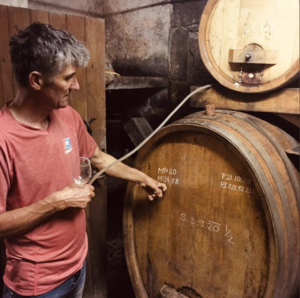Radovan Šuman was born in Slovenian Styria, in the foothills of the Southern Alps, when it still belonged to Yugoslavia. His father, also a winemaker, fell ill when Radovan was a teenager, leaving him in de facto control of the family’s 300-year old winery and its four hectares of vines, composed of around a dozen, mostly Eastern European varieties. Those early years were essential for Rado’s self-teaching, having no point of reference other than his own intuition. In his spare time, he dedicated himself to the study of two of Yugoslavia’s most popular national pastimes, wrestling and quantum physics. The former, he says, taught him important lessons about his own humanity and the latter, importantly, led him to the teachings of Rudolf Steiner, the founder of biodynamic agriculture, which Rado has practiced avidly for the last two decades.

Radovan Šuman with a chestnut foudre of Moon Drops
Totally isolated in his youth from parallel currents in Western Europe, Šuman didn’t think of what he was doing as natural wine, even though he never used additives in his winemaking and never has in the subsequent 30 years. For the most part, his cellar work relies on long maceration for both reds and whites, followed by long élevage in old oak, chestnut, and cherry foudres to gain stability and age-worthiness. Since sulfites are not used at any point during vinification, racking is left to a minimum. Wines are seldom topped up, allowing for a pleasant oxidative profile to offset the aromatic notes of varities such as Gewurztraminer and Welschriesling.
Radovan’s approach to viticulture is even more radical. Around a decade ago, he renounced the use of sulfur and copper sprays, a daring move even among seasoned organic farmers. Instead, Rado relies on a variety of herbal infusions and his beloved flock of sheep. He has also made the decision to end ploughing entirely. Though his yields are somewhat lower, he believes that his soils have never been healthier and that the energy transferred to the wines, and ultimately to those who consume them, is an unquantifiable good —what fellow Slovenian, Slavoj Žižek, might call a “quantum good.”
